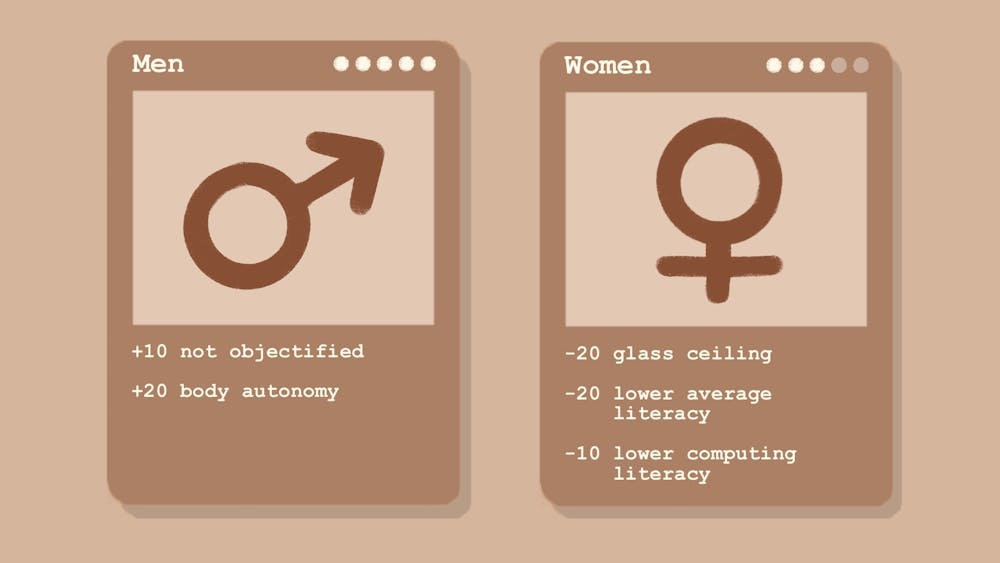A man at a party once demanded me to explain why organizations like the Society of Women Engineers need to exist. I was one of two women in the room, which had seven men. I checked my instinctive frustration and gave a cautious response.
I explained to him these organizations were meant to bring awareness about computing literacy and — in some cases — basic literacy among women, especially those in marginalized communities. I told him women, irrespective of race, have been historically underprivileged.
He actually asked me to justify the last part of my statement.
I replied with a list of injustices I thought he should have known already: a higher risk of violent attacks, not being prioritized for education in mixed-gender households and lack of body autonomy for women. It was not my job to educate him, but I did it anyway.
He received a predictable amount of support from some of the other men there that night. Of the several accusations, one was about women who capitalize on their appearance to get ahead in their career. Another one was about how society looks at violence against men and women differently, his example was that it is okay to hit a man but not a woman.
It should be noted that feminism, in fact, condemns all forms of violence, regardless of who the victim is and asks for equality among the genders.
I was even more appalled because these men were from India, a country where I lived and saw women still fighting for basic human rights. I grew up thinking intersectional feminism, which recognizes both social and political identities can be stacked to create new modes of discrimination, was the only kind of feminism. White feminism, which focuses on the experiences of white women and fails to recognize intersectionality, was a distant concept to me.
Women in some countries, such as Saudi Arabia, are still celebrating getting the right to drive. If a woman has been assaulted, they are relieved if their charges are registered, because sometimes they are disregarded — especially if they were intoxicated during the incident or if they were not dressed conservatively. Transgender women in these places still do not have social acknowledgement and crimes against them are not taken seriously.
Restrictive measures
It seems a significant portion of women's energy goes into explaining sexism to its perpetrators. Feminism has been under attack since the concept was formed.
Men’s rights activists have fixated on privileged women enjoying undue advantage. There is a refusal to acknowledge the vulnerable state of women on a global scale, and the focus is only on the small, privileged section of women, especially white women, in a handful of developed countries.
Feminism holds multiple meanings for people of different socio-economic backgrounds. In many parts of the world, sexism takes the form of denying basic rights to girls and women. Families below the poverty line invariably refuse to send girl children to school for fear of expenses. In this case, equality is simply providing protective measures to ensure that the playing field is leveled, which should not be equated to giving women undue privilege.
“This kind of everyday routine violence causes deep harm to a person when you are made secondary," said Yasmin Saikia, a professor of south Asian studies at ASU. "It is connected to social and cultural norms that reduce women to a place where it is possible for this kind of violence to operate.”
In fact, protection is often restrictive.
“It’s so unsafe that parents tell young girls not to go out at night,” Saikia said. “It’s not because parents want to deny them the right, but because they are afraid of external violence from which they cannot protect them.”
Perhaps the greatest male privilege of all is the ability to move around freely without fear of sexual harm, at least not to the degree that women suffer it.
It has always been convenient to refuse women equality by highlighting these disadvantages and scaring them into submission.
Definition disagreements
Even though the definition of feminism is equality for all genders, equality itself is perceived differently by different people.
Jill Horohoe, a history and gender studies professor, said too many people only validate the definition of feminism that allows society to withhold equality from selected groups of women.
“Not everybody says, 'OK, let’s bring everybody up and protect everybody’s rights,'" Horohoe said. "And so, I think the definition of feminism and equality is different for a lot of people.”
Horohoe said the Equal Rights Amendment, which would guarantee legal gender equality between men and women, was shelved in the 1970s because some women, such as Phyllis Schlafly, convinced others that equality was not the best idea for women, and they didn't know how good they had it.
“That in itself is a scare tactic in a way to kind of punish women for wanting equality," she said. "'Be careful. You don’t want equality because then you might have to register for the selective service and be drafted into war. You might not get any rights to maternity leave.' And I think it’s important to realize how powerful that threat is.”
True equality must include the restoration of rights that have been snatched from women, as well as the renouncement of protective measures or 'privileges' that took their place over time. The problem is these two categories are so intertwined that it is simply too easy to settle for a definition of feminism that suits one best — one that is convenient.
Educated, privileged men know that. They watch the plight of the people in these parts of the world in documentaries and then post eloquent paragraphs about them on social media.
Then they lean back and ask women to explain how they have been historically underprivileged.
Reach the reporter at abhilasha.mandal@asu.edu and follow @AbhilashaMandal on Twitter.
Like State Press on Facebook and follow @statepress on Twitter.




